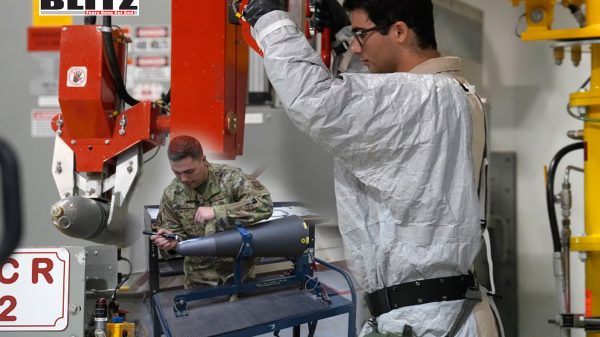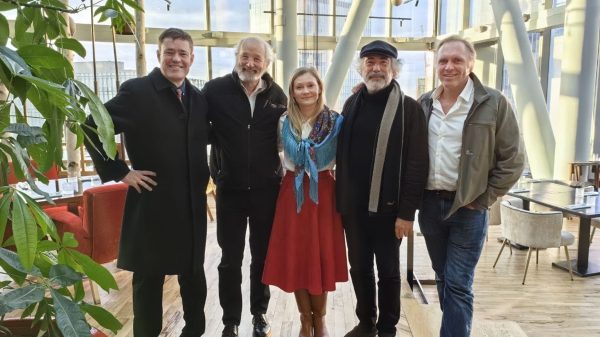Valerie Ann Taylor’s selfless service to humanity in Bangladesh
- Update Time : Monday, January 29, 2024

If there is one woman in Bangladesh who deserves all the accolades known on earth, as-well-as the keys to the kingdom of heaven, it has to be Valerie Ann Taylor, OBE. She recently won the prestigious 2023 Humanitarian Service award from the World Physiotherapy Humanitarian Service.
Valerie personifies humanity, compassion, and all the virtues written in the good books. She’s an ambassador of heaven itself… and there are not many of those around. On top of that she’s simply a sweet lovely lady with a heart of gold so big, it makes the Bangladesh gold reserves seem miniscule and pale into insignificance.
Valerie is the best example I know of perfection in human character, human kindness, humility, and human nature. She is someone who oozes much benevolence, feeling, love and compassion for her fellow humans – especially the differently abled. The lady (and unequivocally she is that) is a waterfall of human kindness in stature comparable to Victoria Falls.
Valery who was born on February 8, 1944 is a young 80-year-old physiotherapist by profession. She’s also a philanthropist, an inspiration to millions and a ‘mother’ to thousands, although none are biologically her own. She never married, but many offers were there. Who has the time for such frivolous time-consuming distractions when you are on a mission from God to help bring happiness and dignity into the lives of the differently abled – perhaps the most ignored layer of Bangladesh society? Jesus hadn’t.
Not only has Valerie devoted most of her life to helping and supporting the differently abled in mind, body, and soul, but she also adopted two differently abled Bangladeshi girls — Poppy and Joyti — who are the love of her life.
Valerie has been justly decorated with numerous awards. In 1998 she was granted Bangladeshi citizenship and in 2004 she was bestowed the Bangladesh Independence Day award and she’s a recipient of “Shadhinota Dibosh Podok” – the highest civilian award of Bangladesh.
Honors of any kind, however, embarrass her and cause her to blush. She does not perform her God-inspired work in pursuit of attention, certificates, dust-collecting trinkets, gold medals, plaques, trophies or indeed recognition of any kind. A smile from her grateful patients is the only exception.
In fact, the inimitable Valerie never views honors as just being for her. She feels the necessity to share them with her ‘family members’. In addition to her two adopted girls, her ‘family’ (or well-wishers, or fan club membership) is massive in size and extends to many countries including Sweden, Canada, Germany and America. They’re popularly known as Friends of CRP (FCRP) and extend moral and financial support to her honorable work.
Valerie, who arguably is one of the greatest humanitarians of the 21st century, holds only the most humble opinion of herself and achievements. People like me who know her, speak her name in awe and in solemn reverence. She’s a saint among us.
When the young physiotherapist first arrived in Bangladesh as a Volunteer Service Overseas member, she only intended to stay for 15 months…. perform God’s work under a sun-lit sky … have a morsel of a holiday… see a bit of Bangladesh… and then return to Buckinghamshire.
That was her plan, but it wasn’t what Allah had in mind. When the young spinster witnessed the horrific plight of differently abled people in Bangladesh it was impossible for her to forget and return to her comforts in the UK. Her conscience wouldn’t allow it.
She searched high and low for an organization or institution in Bangladesh that provided adequate care to people with spinal injuries – there wasn’t one. In 1979, after 10 years of head knocking, door knocking, and knock-backs that would have persuaded most of us to give up, feisty Valerie refused. Then 35, she opened the Centre for the Rehabilitation of the Paralyzed (CRP) in Savar, near Dhaka and bequeathed a whole new world for the differently abled. There are now branches in Ashulia, Barishal, Chattogram, Kulaura, Manikganj, Mirpur, Moulvibazar, Mymensingh, Pabna, Rajshahi and Sylhet.
When CRP first opened it had four patients, but has since benefitted hundreds of thousands. Now the CRP facilities are huge – a heaven on earth for the differently abled. There is a 100-bed hospital for spinal injuries, an operating theatre, and workshops where patients learn and are paid to make low cost export quality wheelchairs using locally available materials and bicycle and rickshaw parts, which enables repair work to be carried out cheaply in a local village.
Other services include vocational re-training for differently abled women, medical, therapy and diagnostic services and training of health professionals.
It promotes empowerment of differently abled people through community-based services, advocacy and networking on disability issues, empowerment of abled differently girls and women, and raises awareness on disability issues. They also work with children with Cerebral Palsy and teach parents how to cope with the condition.
“Thanks to hundreds, maybe thousands of people, CRP is what it is today. Many come and give their time as volunteers and having seen what we do, they often return home, and raise money in their own country for our work to continue,” she said.
In December 2009 I was honored to share a platform as guest speaker with Valerie. KidZcare School had organized a workshop for the parents of children with special needs.
During my delivery, I paid heart-felt homage to Valerie and dubbed her the ‘Mother Teresa of Bangladesh’. Her pale Buckinghamshire cheeks blushed bright red with embarrassment, God love her!
Later when interviewed by a national British newspaper she admitted feeling humbled and awkward at the time and told the reporter: “I’m just very simple, plain old Valerie Taylor”.
I doubt if you could meet a person who is more humble, kind, more loving, more caring, more compassionate, and more down to earth as she.
Before her God-sent arrival, physically handicapped people in Bangladesh were looked down upon and their lives were miserable.
“Being differently abled is not a punishment from Allah, but more of a test for Him to see how we treat or mistreat our fellow humans,” Valerie said.
Erecting a statue in her honor would be of no interest to her whatsoever. She seeks nothing for herself, just assistance to keep her noble work afloat.

















Leave a Reply